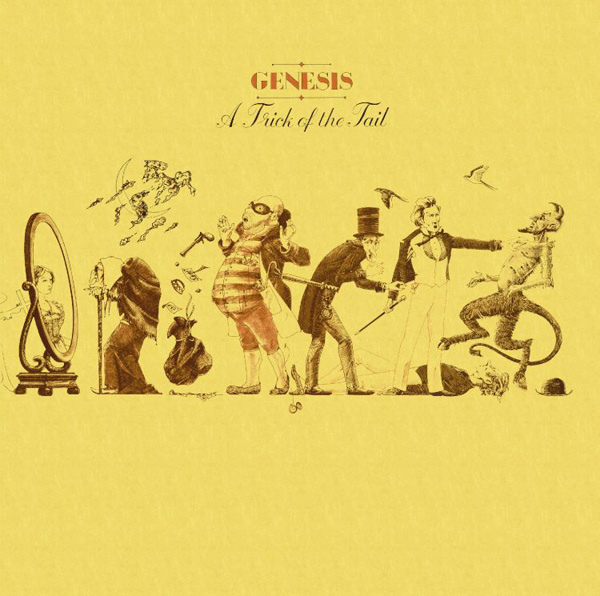
A Trick Of The Tail (1976)

1.Dance on a Volcano
2.Entangled
3.Squonk
4.Mad Man Moon
5.Robbery, Assault & Battery
6.Ripples
7.A Trick of the Tail
8.Los Endos
When Peter Gabriel announced his departure from Genesis in 1975, the reaction from fans was, unsurprisingly, one of collective dread. For many, it was akin to imagining Wings without McCartney—technically feasible, perhaps, but emotionally untenable. Gabriel’s flamboyant stage persona, from fox-headed cross-dresser to amorphous Slipperman, had become so intertwined with the band’s identity that Genesis without him seemed an existential contradiction.
Yet, behind the scenes, there was something approaching relief. For all his lyrical brilliance and theatrical command, Gabriel had gradually come to overshadow the ensemble—a development that did not sit entirely comfortably with the remaining members.
A search for a new frontman commenced in earnest, with Phil Collins, ever the diligent harmony vocalist, guiding auditionees through melodies from behind the kit. After a series of false starts, the solution, like so many elegant ones, had been hiding in plain sight. Collins tentatively put himself forward. A singing drummer? The idea seemed faintly absurd. And yet, when tested, it worked. More than worked, in fact—it galvanized the group.
A Trick of the Tail, released in early 1976, did the unthinkable: it proved that Genesis could thrive without Gabriel. The album was not a pastiche nor a denial of their past, but a gentle evolution. The surrealism was dialed down, the theatricality reined in, and in its place came warmth, clarity, and a renewed sense of musicality.
The opening track, Dance on a Volcano, is a deft bridge between eras—rhythmically complex, melodically rich, and still steeped in the band’s signature imagery. It serves as both declaration and reassurance: Genesis remains intact. Entangled and Ripples are striking in their refinement—quasi-classical in tone, elegiac in atmosphere, and curiously untouched by the prevailing rock trends of the period. One can easily imagine these pieces transposed for string quartet, so gentle and composed are their lines.
Mad Man Moon, a Tony Banks composition, leans into wistfulness, its narrative veering between fantasy and introspection, underpinned by ornate piano textures. Collins, newly promoted to lead vocalist, handles the material with a delicacy few expected. His phrasing is precise, his tone affecting—less theatrical than Gabriel’s, to be sure, but no less emotive for its restraint.
In a rather surprising turn, Robbery, Assault and Battery introduces a measure of levity, its cartoonish narrative bordering on parody. Yet even this feels deliberate—a signal that the band, newly unburdened of their mythic spokesman, was now capable of lightness. The title track, A Trick of the Tail, is charmingly Beatlesque, a melodic curio that recalls McCartney’s melodic inventiveness more than any prior Genesis number. And then there is Los Endos, a muscular instrumental coda that masterfully revisits themes from earlier in the album—part summation, part exclamation mark.
If criticism is to be made, it lies in the album’s indulgence in length. Certain passages—Entangled and Ripples especially—might have benefitted from a more rigorous editorial hand. Though Genesis had, by now, made the extended suite a part of their vocabulary, not every melody warrants a six-minute elaboration. Still, these are minor blemishes on an otherwise assured statement.
In the end, A Trick of the Tail achieved the impossible. It not only allayed fears of post-Gabriel collapse, it introduced a version of Genesis that many would come to consider definitive. The flamboyant masks had been set aside; the music, paradoxically, had never sounded more human.
Go back to the main page
Go To Next Review